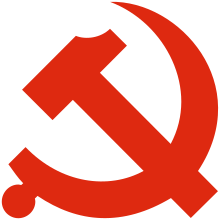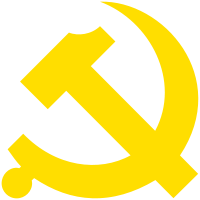National Congress of the Communist Party of China
The National Congress of the Communist Party of China (NCCPC; Chinese: 中国共产党全国代表大会; pinyin: Zhōngguó Gòngchǎndǎng Quánguó Dàibiǎo Dàhuì; literally: Chinese Communist Party National Representatives Congress) is a party congress that is held every five years. The National Congress is theoretically the highest body within the Communist Party of China. Since 1987 the National Congress has been held in the months of October or November. The venue for the event, beginning in 1956, is the Great Hall of the People in Beijing. In the past two decades the National Congress of the CPC has been pivotal at least as a symbolic part of leadership changes, and therefore has gained international media attention.
National Congress of the Communist Party of China 中国共产党全国代表大会 | |
|---|---|
 Communist Party of China emblem | |
| Type | |
| Type | |
Term limits | Five years |
| Leadership | |
Authority | |
Jurisdiction | |
| Meeting place | |
 | |
| Great Hall of the People Beijing, China | |
| Website | |
| en | |
Since the mid-1980s, the Communist Party has attempted to maintain a smooth and orderly succession and avoiding a cult of personality, by having a major shift in personnel every ten years in even number party congresses, and by promoting people in preparation for this shift in odd number party congresses.
In addition, as people at the top level of the party retire, there is room for younger members of the party to move up one level. Hence the party congress is a time of a general personnel reshuffle, and the climax of negotiations that involve not only the top leadership but practically all significant political positions in China. Because of the pyramid structure of the party and the existence of mandatory retirement ages, cadres who are not promoted at a party congress are likely to face the end of their political careers.
In addition to making leadership changes, the Congress also reviews and changes, if necessary, the Party's Constitution, and selects the Central Committee, a powerful decision making body. Each five-year cycle of the National People's Congress also has a series of plenums of the Central Committee which since the mid-1990s have been held more or less regularly once every year.
Similar to the practice of the NPC, the delegates to the Congress are formally selected from grassroots party organizations, and like the NPC, there is a system of staggered elections in which one level of the party votes for the delegates to the next higher level. For the National Congress, delegates are elected by the Communist Party's provincial level party congresses or their equivalent units in a selection process that is screened and supervised by the party's Organization Department as directed by the Politburo Standing Committee.[1]
Keys
| Abbreviations | |
|---|---|
| CC | Central Committee |
| CCDI | Central Commission for Discipline Inspection |
| FM | Full member (a member with voting rights). |
| AM | Alternate member (a member without voting rights). |
| VD | Voting delegate (a delegate who can vote). |
| AD | Alternate delegate (a delegate who cannot vote). |
| DU | Data unavailable. |
| SID | Specially invited delegate (a party member who has retired, but giving ordinary delegate rights). |
| Political Report | Political Report to the Central Committee, a document which briefs delegates about the period since the last congress and future work. |
| Constitution | Constitution of the Communist Party of China, the fundamental governing document of the CPC. Formerly known as the Charter. |
| PMR | Party members represented at the congress by delegates (the party membership at the time). |
Convocations
| Congress | Duration (start—end) |
Delegates | Electoral units |
Elected | Political Report (presented by) |
Constitution (changes) |
PMR | |
|---|---|---|---|---|---|---|---|---|
| CC | CCDI | |||||||
| 1st National Congress 8 days None |
23–31 July 1921 | 12 | 7 | — | — | Chen Duxiu | — [note 1] |
50 |
| 2nd National Congress 7 days CC consultations |
16–23 July 1922 | 12 | DU | 5 FM – 3 AM |
— | Chen Duxiu | 1st Charter | 195 |
| 3rd National Congress 8 days CC appointments |
12–20 June 1923 | ~30 | DU | 9 FM – 5 AM |
— | Chen Duxiu | Amendment | 420 |
| 4th National Congress 11 days CC appointments |
11–22 January 1925 | 20 | DU | 9 FM – 5 AM |
— | Chen Duxiu | Amendment | 994 |
| 5th National Congress 13 days 1927 election |
27 April–9 May 1927 | ~80 | 11 | 22 FM – 14 AM |
— | Chen Duxiu | Amendment [note 2] |
57,967 |
| 6th National Congress 23 days 1928 election |
18 June–11 July 1928 | 84 VD – 34 AD |
17 | 14 FM – 13 AM |
— | Qu Qiubai | 2nd Charter | 130,194 |
| 7th National Congress 49 days 1939–1945 election |
23 April–11 June 1945 | 544 VD – 208 AD |
8 | 44 FM – 33 AM |
— | Mao Zedong | 3rd Constitution | 1,210,000 |
| 8th National Congress 30 days 1955–1956 election |
15–27 September 1956 – 5–23 May 1958 |
1,026 VD – 86 AD |
31 | 97 FM – 73 AM |
— | Liu Shaoqi | 4th Constitution | 10,730,000 |
| 9th National Congress 23 days 1968–1969 election |
1–24 April 1969 | 1,512 | DU | 170 FM – 109 AM |
— | Lin Biao | 5th Constitution | 22,000,000 |
| 10th National Congress 4 days 1972–1973 election |
24–28 August 1973 | 1,249 | DU | 194 FM – 124 AM |
— | Zhou Enlai | 6th Constitution | 28,000,000 |
| 11th National Congress 6 days 1976–1977 election |
12–18 August 1977 | 1,510 | DU | 201 FM – 132 AM |
— | Hua Guofeng | Amendment | 35,000,000 |
| 12th National Congress 6 days 1981–1982 election |
1–11 September 1982 | 1,600 VD – 149 AD |
DU | 210 FM – 138 AM |
132 | Hu Yaobang | 7th Constitution | 39,000,000 |
| 13th National Congress 8 days 1986–1987 election |
25 October–1 November 1987 | 1,936 VD – 61 SID |
33 | 175 FM – 110 AM |
69 | Zhao Ziyang | Amendment | 46,000,000 |
| 14th National Congress 6 days 1991–1992 election |
12–18 October 1992 | 1,989 VD – 46 SID |
34 | 189 FM – 130 AM |
108 | Jiang Zemin | Amendment | 51,000,000 |
| 15th National Congress 7 days 1996–1997 election |
12 September – 18 September 1997 |
2,074 VD – 60 SID |
36 | 193 FM – 151 AM |
115 | Jiang Zemin | Amendment | 58,000,000 |
| 16th National Congress 7 days 2001–2002 election |
8–14 November 2002 | 2,114 VD – 40 SID |
38 | 198 FM – 158 AM |
121 | Jiang Zemin | Amendment | 66,000,000 |
| 17th National Congress 7 days 2006–2007 election |
15–21 October 2007 | 2,217 VD – 57 SID |
38 | 204 FM – 167 AM |
127 | Hu Jintao | Amendment | 73,363,000 |
| 18th National Congress 7 days 2011–2012 election |
8–14 November 2012 | 2,270 VD – 57 SID |
40 | 205 FM – 171 AM |
130 | Hu Jintao | Amendment | 82,600,000 |
| 19th National Congress 7 days 2016–2017 election |
18–24 October 2017 | 2,280 VD – 57 SID |
40 | 204 FM – 172 AM |
133 | Xi Jinping | Amendment | 89,000,000 |
Notes
- The 1st National Congress conceived of a party program, a document which focuses on ideology rather than explaining the organizational structure of the party.[2]
- Decided by congress that the 5th Politburo would amend the constitution after the congress.[2]
References
Citations
- Li, Cheng (2012). "Preparing For the 18th Party Congress: Procedures and Mechanisms" (PDF). China Leadership Monitor (36). Archived (PDF) from the original on November 4, 2016. Retrieved October 18, 2017.
- Wu 2015, p. 182.
Sources
Information on congresses, number of delegates, electoral units, number of people elected to CCs, party membership, the individual who presented the Political Report and information on when the congress was convened can be found in these sources:
- "The 1st National Congress". People's Daily. Central Committee of the Communist Party of China. Archived from the original on May 28, 2016. Retrieved January 13, 2017.
- "The 2nd National Congress". People's Daily. Central Committee of the Communist Party of China. Archived from the original on March 30, 2019. Retrieved January 13, 2017.
- "The 3rd National Congress". People's Daily. Central Committee of the Communist Party of China. Archived from the original on June 12, 2019. Retrieved January 13, 2017.
- "The 4th National Congress". People's Daily. Central Committee of the Communist Party of China. Archived from the original on May 28, 2016. Retrieved January 13, 2017.
- "The 5th National Congress". People's Daily. Central Committee of the Communist Party of China. Archived from the original on April 1, 2014. Retrieved January 13, 2017.
- "The 6th National Congress". People's Daily. Central Committee of the Communist Party of China. Archived from the original on April 1, 2014. Retrieved January 13, 2017.
- "The 7th National Congress". People's Daily. Central Committee of the Communist Party of China. Archived from the original on January 8, 2019. Retrieved January 13, 2017.
- "The 8th National Congress". People's Daily. Central Committee of the Communist Party of China. Archived from the original on January 15, 2019. Retrieved January 13, 2017.
- "The 9th National Congress". People's Daily. Central Committee of the Communist Party of China. Archived from the original on January 14, 2019. Retrieved January 13, 2017.
- "The 10th National Congress". People's Daily. Central Committee of the Communist Party of China. Archived from the original on January 13, 2019. Retrieved January 13, 2017.
- "The 11th National Congress". People's Daily. Central Committee of the Communist Party of China. Archived from the original on January 19, 2019. Retrieved January 13, 2017.
- "The 12th National Congress". People's Daily. Central Committee of the Communist Party of China. Archived from the original on January 8, 2019. Retrieved January 13, 2017.
- "The 13th National Congress". People's Daily. Central Committee of the Communist Party of China. Archived from the original on January 13, 2019. Retrieved January 13, 2017.
- "The 14th National Congress". People's Daily. Central Committee of the Communist Party of China. Archived from the original on May 18, 2017. Retrieved January 13, 2017.
- "The 15th National Congress". People's Daily. Central Committee of the Communist Party of China. Archived from the original on May 18, 2017. Retrieved January 13, 2017.
- "The 16th National Congress". People's Daily. Central Committee of the Communist Party of China. Archived from the original on August 17, 2015. Retrieved January 13, 2017.
- "The 16th National Congress". People's Daily. Central Committee of the Communist Party of China. Archived from the original on August 17, 2015. Retrieved January 13, 2017.
- "The 17th National Congress". China Today. Archived from the original on July 11, 2017. Retrieved January 13, 2017.
- "Election of the delegates to the 18th National Congress of CPC". china.org.cn. August 14, 2012. Archived from the original on October 26, 2017. Retrieved January 13, 2017.
- Wu, Guoguang (2015). China's Party Congress: Power, Legitimacy, and Institutional Manipulation. Cambridge University Press. p. 70. ISBN 978-1-107-08202-1.
Bibliography
- Wu, Guoguang (2015). China's Party Congress: Power, Legitimacy, and Institutional Manipulation. Cambridge University Press. ISBN 978-1-107-08202-1.
.svg.png)
